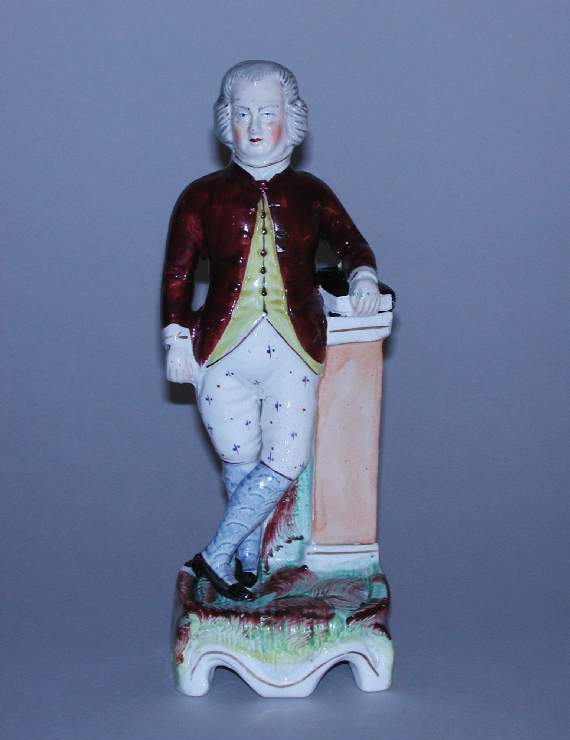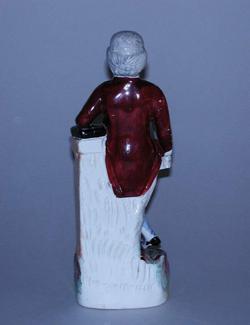Current Location: In storage
Titles
Shepherd
Maker(s)
Production:
Unidentified factory
Entities
Categories
Description
Earthenware, moulded with modelled additions, lead glazed and painted with polychrome enamels.
Earthenware figure representing a gentleman in relaxed pose with his arm on a book which rests on a square pedestal. He wears a wig, a red-brown coat over a yellow waistcoat, breeches with a sprig pattern and wavy blue stockings. He stands on a green and brown grassy mound, the bottom edge of which has been cut into a scroll at the front. The back is flat and only partially painted. The underside is recessed and glazed.
Notes
History note: Bought from Mr Bishop at Bideford on 1 October 1912 for £1.7s 6d (one pound seven shillings and sixpence) by Dr J.W.L. Glaisher, Trinity College, Cambridge.
Legal notes
Dr J. W. L. Glaisher Bequest
Acquisition and important dates
Method of acquisition: Bequeathed
(1928)
by
Glaisher, J. W. L., Dr
Dating
19th Century, second quarter
Circa
1830
CE
-
1840
CE
Note
Pearlware figures decorated with enamels were in production by 1780. They were generally made at smaller potteries and are rarely marked. A cheaper alternative to porcelain figures, they drew on a variety of 3-D sources, including sculpture and porcelain figures. Classical, biblical, mythological and literary subjects were popular, as were animals and representations of rural life, seasons and trades. From the early 19th Century, scenes from everyday life and topical events were also common. These early figures are moulded, perhaps with moulded or modelled parts added, the bases often formed separately. After around 1810-1820, bocage (stylised foliage) is common and figures are often more vibrantly coloured. By c.1835, these early methods had largely given way to three-part press-moulding, which enabled cheaper, mass production of figures for a growing market.
This figure is clearly a portrait and is probably based on a contemporary engraving. Dr Glaisher suggests the subject may be George Washington (1732-1799), the first President of the United States. The flat-back style and painting of the figure indicate an 1830s date, so perhaps it commemorates Washington’s centenary.
Components of the work
Decoration
composed of
enamels
lead-glaze
Parts
Wholee
Materials used in production
White earthenware
References and bibliographic entries
Identification numbers
Accession number: C.983-1928
Primary reference Number: 76493
Old object number: 3496
Stable URI
Audit data
Created: Saturday 6 August 2011
Updated: Monday 29 April 2024
Last processed: Tuesday 15 July 2025
Associated departments & institutions
Owner or interested party:
The Fitzwilliam Museum
Associated department:
Applied Arts





